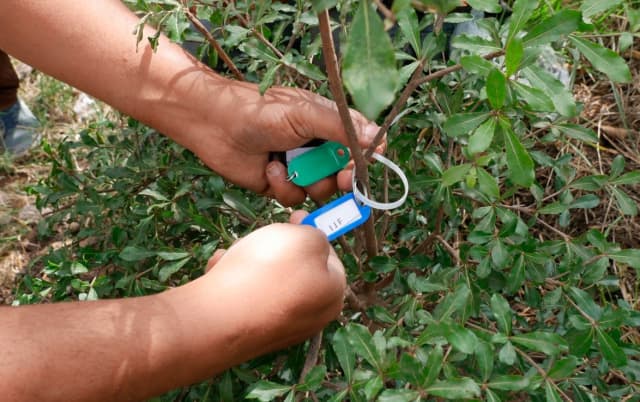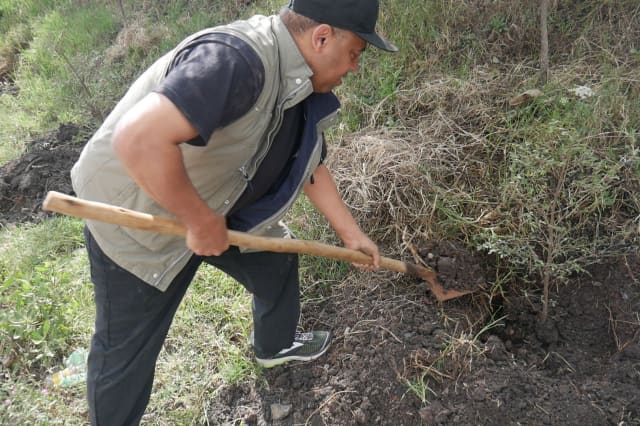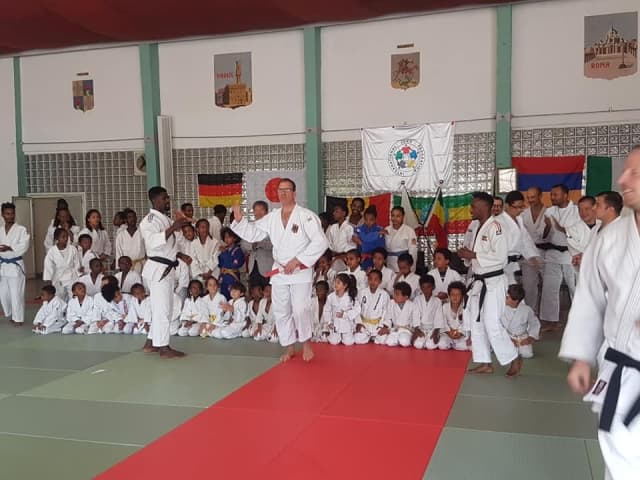Tsegaye has been working for Daimler for nineteen years, as Diversity Officer at Mercedes-Benz Wholesale Germany and is responsible for human resources communication. During his last visit to his old home country, he planted trees with his own initiative, to contribute to the reforestation of Ethiopia. He explained, "For years, I have been a volunteer for judo. The focus of my engagement is teaching values in sport and transferring knowledge in the field of development economics between Germany and Ethiopia. This has resulted in making a great number of contacts. In October 2018, for example, I was able to accompany the Nobel Peace Prize winner and Prime Minister of Ethiopia, Abiy Ahmed, at the ‘Compact with Africa’ G20 Summit in Berlin. From this project 350 million tree seedlings were planted in the country within twelve hours, in the summer of 2019; winter time in Ethiopia. Between 1960 and 2012, construction projects and deforestation had reduced the forest cover in Ethiopia from 37 to just 3 percent of the country's land. I felt inspired to plant trees during one of my visits to my home country. I already had much contact with the topic of sustainability, during my studies."
We met with Dr. Tsegaye Degineh and asked him a few more questions.
IJF: Dr. Tsegaye Degineh, last year, the World Judo Day theme was 'Plant a tree.’ More than 6,000 trees were planted throughout the world. Do you see a common objective with your initiative?
Dr. Tsegaye Degineh: Absolutely, our sport brings body, mind and spirit in contact with the universe and nature. It is very important to find our connection with nature and contribute to a better world and that includes the conservation of green areas and the action of tree planting. I really liked that the World Judo Day 2019 initiative helped to plant 6,000 trees. The IJF is a role model. I think if each judoka plants a tree, we will have millions of new trees around the world. By the way, we celebrated the World Judo Day in Ethiopia many times, particularly with our judo friend, Mr. Daxbacher and his wife Regina, by organising big judo seminars.
IJF: Did you link your personal initiative with judo in Ethiopia? Did the judo community help you plant trees?
Dr. Tsegaye Degineh: During my tree-planting initiative, I planted trees on behalf of my colleagues and those who are very close to me. The first place to plant was located at the sports venue in Addis Ababa. Our judokas were actively involved in preparing the place for us in cooperation and goodwill with the sports commissioner of Addis Ababa. Our judokas were already involved in the last Green Legacy Programme that was initiated by the Ethiopian Prime Minister, Nobel laurate Abiy Ahmed.
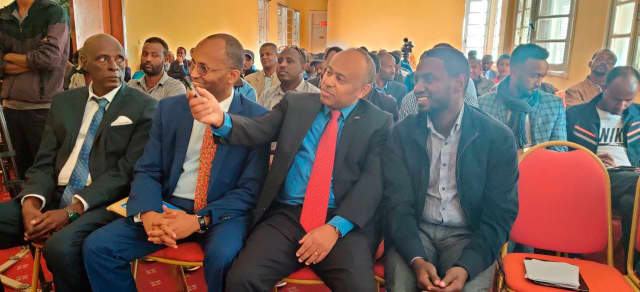
IJF: Judo’s motto is ‘Mutual aid and welfare.’ Why is it so important to preserve our planet and to help the young generation to understand the true challenges of tomorrow?
Dr. Tsegaye Degineh: We need a better world for tomorrow and must all work to make the world worthy of its children. That's why our training is not only physical, but also mental and goes beyond the dojo towards our handling of society as a whole and towards nature in particular. We can be proud witnesses of that judo motto, ‘mutual aid and welfare’ and know that it is more than a slogan, particularly in the time of this pandemic. I believe martial arts like judo become a vital force in society for changing destructive patterns and enabling life’s wellness and courtesy. I would like to take this opportunity to thank the IJF for the great contribution in this regard.
IJF: What forms the roots of Ethiopia’s new energy into their judo future? What ideas might carry Ethiopia forward; more trees or new ideas?
Dr. Tsegaye Degineh: I think that we, Johannes Daxbacher and I, as well as many supporters and friends, were able to plant a very special metaphorical tree in Ethiopia, together with the IJF – that is our Judo! That was 10 years ago, when, in 2010, Johannes Daxbacher taught judo for the first time on behalf of the IJF in Ethiopia and tried to form the Judo and Ju-Jitsu Association. We received an extremely positive response and so we decided that one of the last countries in the world where there was no structured judo movement should now also receive a ‘judo plant.’
Of course, planting trees, means giving life. Next time we plan to plant twice as many trees. By the way, if one person plants 10-20 trees a year, you have a forest of life that lives long and supports us all. If we give to nature, we will get nature back. Mandela said, ‘it is in your hands to create a better world for all who live in it.’
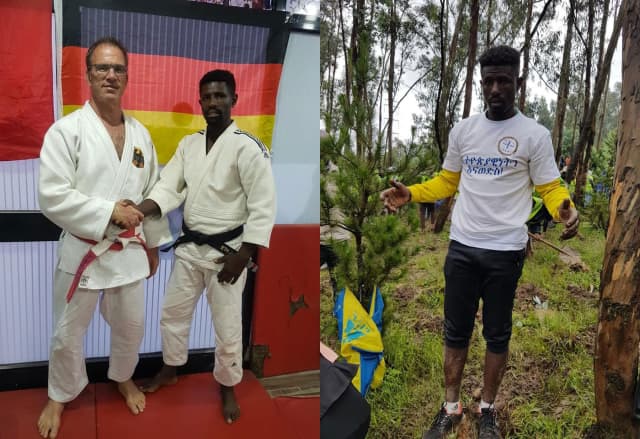
Next time, I plan also to support orphanages. Please let me tell you a heart-wrenching story. I visited an orphanage last December. We had collected toys in Germany and brought them with us. We got access to a house that gives 145 children from 0-6 years old a home. There were many disabled children among them. What really touched me were the very small babies and that when some children came to us they looked into our smartphones and asked for their parents. They said, ‘show me my sister, my mother, show me my father.’ How could we answer that? The living conditions are not easy in such an institution in Ethiopia but I can guarantee that the employees do an amazing job and they deserve our full respect. I remained thoughtful, with a feeling of helplessness, but then I put that in perspective and I believe that we can make changes there in the future.
IJF: What is the current situation with judo in Ethiopia?
Dr. Tsegaye Degineh: Judo and all other martial arts activities are in lock down due to COVID-19. It is particularly difficult for grappling/contact sports. The sports commission plans to reorganise all martial arts federations and associations, which will be a big challenge for our little Judo & Ju-Jitsu activities in Ethiopia. It is still a difficult road to get recognition from the Federal Sport Commission, which requires high standards for new sports. It may be easy to establish a club, but it's a long, long way to go as the standards are the same as other well-established associations, which have several thousand athletes and hundreds of clubs. Some changes in the sports authorities or in the system could also lead to a renewed recognition. The former Ethiopian sports system was very complicated and counterproductive for our sport. To establish a fully recognised federation, you need to have an association in 5 regions that should be founded by 5 clubs and has each at least 10 referees, etc. This means you need at least 25 clubs, 50 referees and thousands of judokas. You also need to own an office to get recognition. Since the reform and the new government took power, things have been improved. We hope for new changes. I am also glad in this regard for being able to advise the Sports State Ministry, in sport knowledge transfer. By the way, I would like to mention the award to Ethiopian Prime Minister Dr. Abiy Ahmed with the highest African sport recognition, the ‘Anoca Order of Merit,’ for his exemplary commitment to sport and the Olympic movement. I am happy to see that Ethiopian sport is moving in the right direction.
IJF: There is a judo for Peace programme in Ethiopia, led together with Johannes Daxbacher, helping local populations and refugees. Could you tell us a bit about it and maybe draw the connection with your tree initiative?
Dr. Tsegaye Degineh: Judo for Ethiopia is a judo for peace programme and is a great success, initiated by my good friend Johannes, who was appointed by Mr. Vizer, the President of the IJF, to set up ‘Judo for Ethiopians.’ The initiative celebrated its 10th anniversary a few months ago. During this time we have trained many hundreds of talented young judokas. Judo was introduced to women and young children as an instrument of self-defence, self-confidence and a tool of conflict resolution. Judo was also introduced to the military and police forces. We have black belts at international level and who visited the IJF Academy.
We have also faced very tough challenges, that we overcame, thanks also to our strong international judo community. During all those enormous challenges, the motto of Johannes Daxbacher and I was ‘never give up!’ Mr. Daxbacher and his wife received the ‘One World Medal’ from the German government for their huge commitment last year, which is a unique moment of recognition and was the first judo prize in the history of German development and cooperation. It has been our plan from the start to include judoka's contributions to nature and society, which also means continuing to plant trees and helping those in need. We are very grateful that the IJF President has been with us from the beginning and would also like to thank all brothers and sisters in judo worldwide, especially from Africa. Once again I would like to repeat the metaphor: we have planted judo as a tree in Ethiopia. This little judo plant has grown quite well, is stable, but certainly needs further support. The Ethiopian judo tree has grown far enough that it can give shade and protection to urban refugees with Ethiopian judo coaches, on behalf of the UNHCR. I am very proud of our Ethiopian judoka and sincerely thank them and all of our friends and supporters.
I would like also to take this opportunity to appreciate the work of the IJF Media department who tells incredible Judo stories and promotes Judo’s good image in society and in nature.

